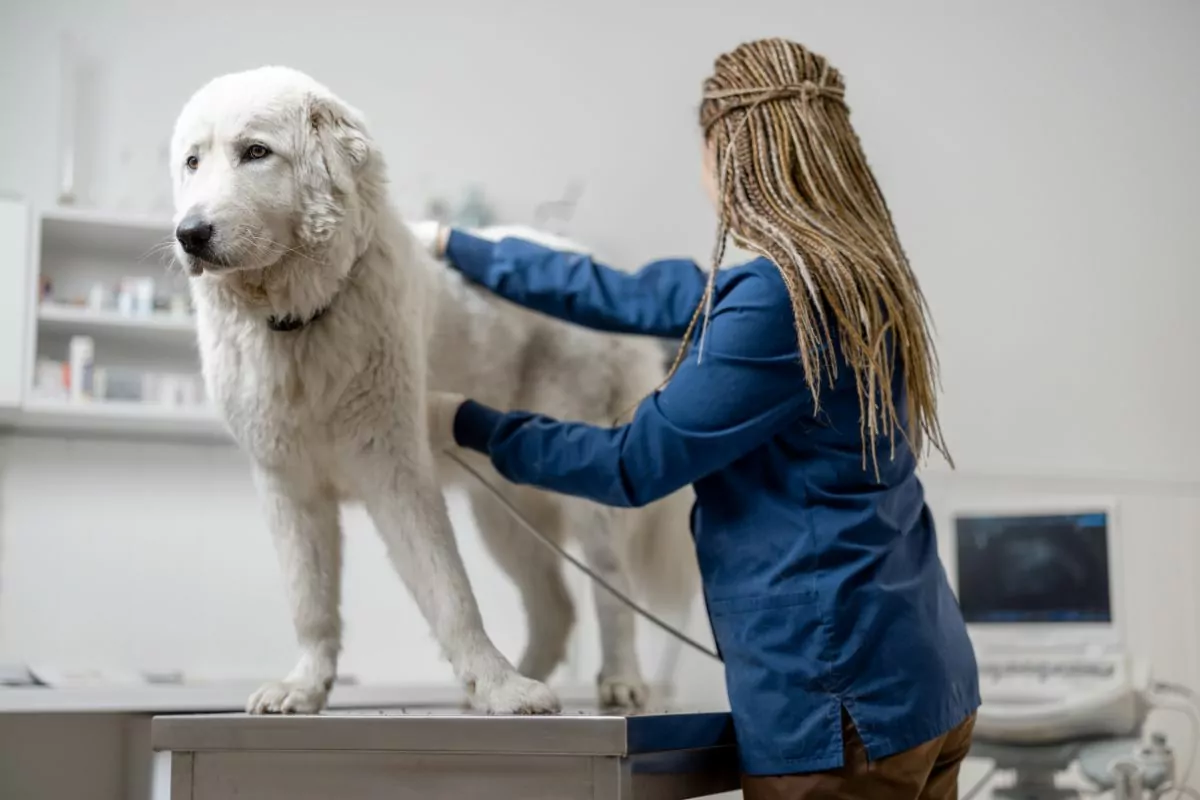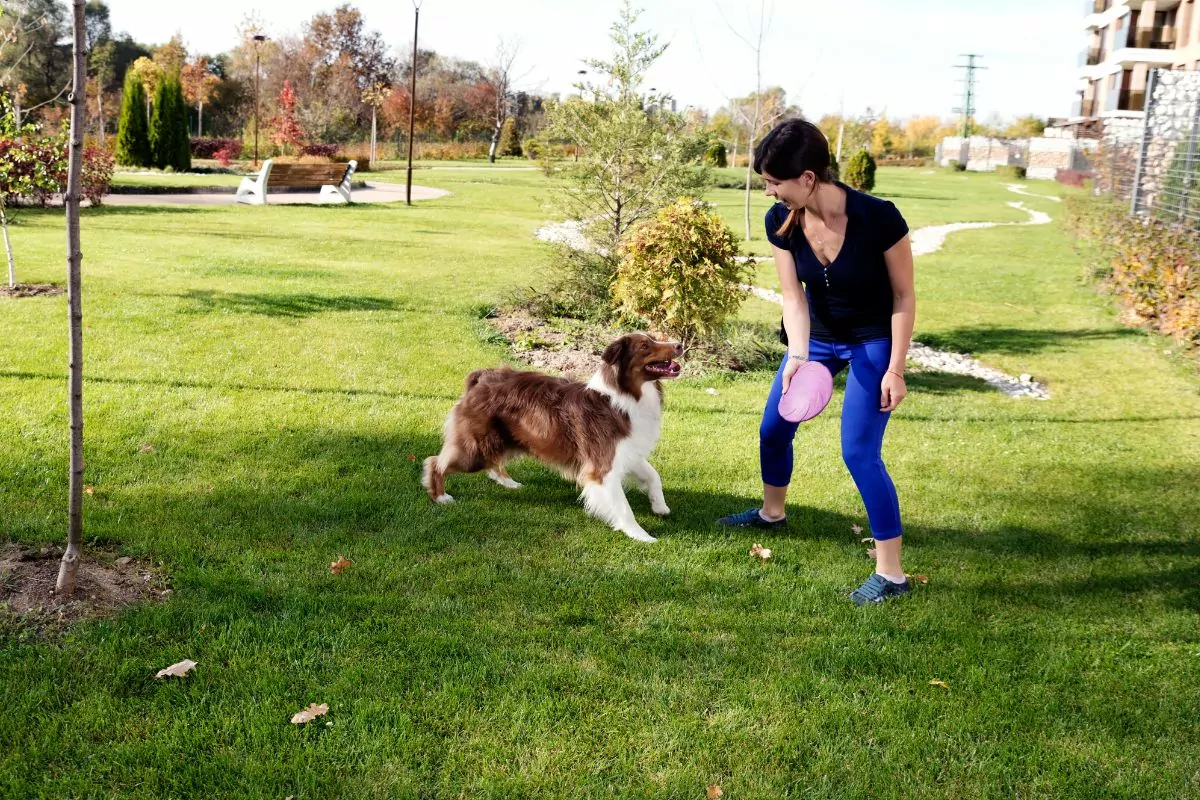What is Stress Colitis in Dogs?
Stress colitis in dogs is inflammation of the large intestine or inflammation of the colon brought on by stress.
A stressful event can be after spending time at doggie daycare, for example, or after an operation. The most commonly seen is stress colitis in dogs after boarding.
Stress can adversely affect dogs in the same way it negatively impacts humans. It can weaken their immune system and increase their bacterial infections and colitis risk.
Stress colitis can be acute or chronic.

The Causes of the Condition
Stress is the most frequent and common trigger of this type of colitis in dogs. Hence the name stress colitis.
Stress triggers in pets can vary and are, broadly speaking, any factor that leads to physical and behavioral distress, such as:
- Post-surgical stress
- Injury
- Exercise
- Environmental changes
- Moving house
- Exposure to unfamiliar conditions
- Fireworks
- Thunderstorms
- Traveling
If your dog develops digestive system upset after any of the above situations, then chances are they are suffering from stress colitis.
Stress Colitis in Dogs – The Symptoms
Below we have listed the signs and symptoms of stress colitis to make it easy for you to recognize them if they develop.
Symptoms include
- Diarrhea
- Increased bowel movement
- Weight loss
- Blood or/and mucus present in stool
- Difficulty defecating
- The stool may be normal in the beginning and progress to a more fluid consistency
- Cramping and excessive gas
If you observe your dog showing any of these symptoms, book an appointment with the veterinarian to check out your doggo.
Usually, stress colitis is self-resolving within a few days. However, if left untreated, it can lead to a chronic form of colitis and put your dog’s health at risk from dehydration and rapid weight loss.
How is it Diagnosed?
If you have any indication that your dog is suffering from stress colitis, then book an appointment to visit your vet.
The veterinarian will perform a complete clinical exam and assess your dog’s general health condition. The sooner you get a diagnosis, the easier it is to treat and manage this condition.
Before the appointment, you should provide your veterinarian with a complete medical history of your dog.
An x-ray or ultrasound to check the health and condition of the digestive system will be performed, and in some cases, a stool sample is also helpful in diagnosing stress colitis.

Treating Canine Stress Colitis
So now that you have a definitive diagnosis let’s see how to treat stress colitis in dogs. There are many options to help you and your beloved pet deal with stress colitis. First, however, your veterinarian will suggest the most suitable treatment plan for you and your dog.
A 12-24hr fast benefits the digestive system by allowing it to take a break and rest. Introducing food slowly after the 24hr fast is over is very important not to shock the digestive system.
Probiotics are cultures of live bacteria that colonize the intestine. These bacteria produce by-products that nourish the intestinal and immune system cells. Because these products colonize the small intestine and not the large, the benefits are speculative in stress colitis.
Still, nevertheless, they can help maintain a healthy digestive system and regular bowel movement.
Prebiotics like Fructooligosaccharides is beneficial for colon bacteria. They help maintain the bacterial population in the colon at a healthy level. They are a dog’s best friend in this instance.
Fructooligosaccharides are carbohydrates digested in the large intestine. They help remove pathogenic bacteria and promote the growth of helpful bacteria, thus can help in resolving diarrhea and helping the digestive system to function properly and smoothly.
Giving your dog an easily digestible bland diet can also help with stress colitis.
The foods listed below are great examples of easily digested foods that strain your pet’s digestive system less.
- Eggs
- Chicken
- Rice
- Some vegetables like carrots and potatoes
- Fruits like apples can also be beneficial
Healthy oil supplements such as omega 3 and omega 6 should also be a part of your dog’s diet. They help maintain a healthy coat, joints, and digestive system.
Your veterinarian may also deem an antibiotic or anti-inflammatory treatment necessary. The veterinarian will prescribe the most suitable medication and dose for your dog.
Dietary fiber added to your dog’s daily meals also helps digestion and allows the intestine to maintain healthy hydration levels.
You can mix dietary fiber in your pet’s food for convenience and ease.
The General Cost of Treatment
The cost of treatment varies according to the treatment plan, the size of your beloved dog, and the type of veterinary hospital you are visiting. Make sure to be open about your financial expectations and what your limits are with your veterinarian.
They will guide you accordingly and develop a plan suitable for your lifestyle and budget.
However, usually, when dealing with stress colitis, there is no need for expensive medications or extensive therapies. A simple change in diet and some supplements should do the trick.
How Long Does Stress Colitis Last in Dogs?
Do you know how long does stress colitis last in dogs? The usual time frame for resolving stress colitis is three to five days.
As unpleasant and stressful events cause stress colitis, it’s more than likely that they will suffer from flare-ups, given stressors are present.
However, managing and preventing stress colitis is possible, given that you follow your veterinarian’s instructions.
Your veterinarian can give you options to help your pup deal with any stressors and maintain a healthy large intestine.
In cases where dogs are severely dehydrated, and symptom severity progresses, hospitalization is necessary. Intravenous fluids and medications will help your pup to recover fully.
Can Dogs Get Diarrhea From Stress?
You may be wondering do dogs get diarrhea from stress?
The answer to your question is yes, they do, and stress colitis is one of the main reasons behind large bowel-related diarrhea.
Similarly to humans, when dogs are stressed, their immune system gets run down. This results in an overgrowth of bacteria in the gut that sets the ground for colitis to appear.
This overgrowth of bacteria triggers stomach upset in the form of soft mucous stools and diarrhea.
The stools usually have a progressive pattern, which means that at first, they may be soft with mucous and blood and then progress to diarrhea.
If your pup suffers from diarrhea, keep them hydrated and seek medical attention to avoid dehydration and electrolyte imbalances.
Preventing the Condition
Prevention is key when treating stress colitis in dogs. While stress colitis flare-ups are unavoidable to some extent, they can be minimized and managed.
Adapt your dog’s diet to an easily digestible one. Especially if you know that a stressful event is coming up, help your furry friend by giving a bland or specialized prescription diet to prepare your dog’s digestive and immune systems to deal with the stress.
Ask your veterinarian about calming supplements. These can work wonders and help keep your pet calm without heavily sedating them.
Several calming sprays are available; for example, you can spray on your dog’s bedding. These contain pheromones and help keep your pooch stress-free.
Gentle body wraps during a stressful event also help your pet by giving them a sense of security and calming them down.
Regular exercise also helps keep stress levels low; however, avoid over-strenuous activity.
Another excellent option is to employ a certified dog trainer. They will help your dog by de-sensitizing them to any stressors. Be careful when choosing a dog trainer. Research their work first and look into their training methods before signing up your doggo for any training course.
If possible, avoid stressful events altogether. If you know, for example, that an event with a firework display is coming up, or a severe thunderstorm is coming, provide your dog with a safe environment and close all windows to reduce noise.

The Final Say
If your dog has been diagnosed with stress colitis, don’t worry. The prognosis is excellent. It is by no means a condition that is debilitating and one that will deteriorate in time. On the contrary, your dog will recover quickly with proper management and care.
A simple revision and change in diet and possibly some medications will return your doggo to its normal active, happy, tail-wagging self in no time. Unfortunately, in these times, stress is an everyday reality in dogs and us humans. We are all impacted in similar ways.
A customized management plan for your dog that works toward eliminating stressors and keeping them in a calm environment is crucial for their health and well-being.
It is imperative to identify the stressors in your dog’s environment. Keeping a journal is helpful to aid you in determining the exact stressors and triggers and maintaining an accurate health record.
Dogs with high energy or an anxious temperament are predisposed to develop stress colitis. It usually appears in younger dogs but can occur at any age. There is no breed predisposition for stress colitis.
If you notice that your dog develops diarrhea after being in a stressful situation, it is more likely that it is stress colitis. Always speak to your veterinarian before administering any medications or remedies. Never administer human medications to your pet.
